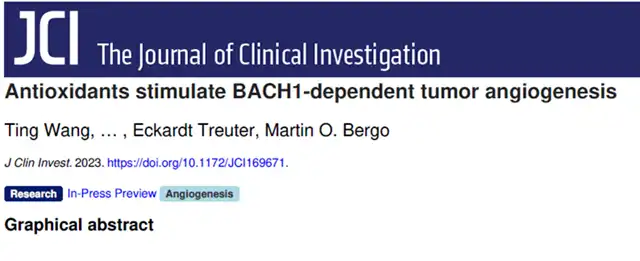Antioxidant Supplementation May Accelerate Tumor Growth and Spread
- Normal Liver Cells Found to Promote Cancer Metastasis to the Liver
- Nearly 80% Complete Remission: Breakthrough in ADC Anti-Tumor Treatment
- Vaccination Against Common Diseases May Prevent Dementia!
- New Alzheimer’s Disease (AD) Diagnosis and Staging Criteria
- Breakthrough in Alzheimer’s Disease: New Nasal Spray Halts Cognitive Decline by Targeting Toxic Protein
- Can the Tap Water at the Paris Olympics be Drunk Directly?
Antioxidant Supplementation May Accelerate Tumor Growth and Spread
- Should China be held legally responsible for the US’s $18 trillion COVID losses?
- CT Radiation Exposure Linked to Blood Cancer in Children and Adolescents
- FDA has mandated a top-level black box warning for all marketed CAR-T therapies
- Can people with high blood pressure eat peanuts?
- What is the difference between dopamine and dobutamine?
- How long can the patient live after heart stent surgery?
Antioxidant Supplementation May Accelerate Tumor Growth and Spread, Study Finds
Recent research published in the Journal of Clinical Investigation by scientists from Sweden’s Karolinska Institute, Zhengzhou University in China, and Peking University sheds light on potential risks associated with high-dose antioxidant supplementation.
The study, titled “Antioxidants stimulate BACH1-dependent tumor angiogenesis,” explores the impact of supplementing vitamins C and E, among other antioxidants, on tumor development and metastasis.

Vitamin C, a crucial water-soluble vitamin known for its various health benefits, including immune system support, antioxidant properties, and cardiovascular health, is commonly added to dietary supplements. As an antioxidant, vitamin C helps neutralize free radicals, reducing oxidative stress on cells and tissues.
However, the study warns against excessive vitamin C intake, as the research suggests that high doses of antioxidants may stimulate the formation of blood vessels within lung cancer tumors, potentially accelerating their growth and spread.
Previous studies by the researchers indicated that antioxidants like vitamins C and E stabilize the BACH1 protein, expediting the growth and spread of lung cancer. When levels of free radicals decrease in the body, this protein becomes activated. Introducing additional antioxidants through diet or activating endogenous antioxidants within tumor cells can trigger this process.
In the study, mice with lung cancer and mice implanted with human cancer cells were provided with water and food containing varying doses of vitamin C, vitamin E, and N-acetylcysteine. The results showed that as the supplement dosage increased, antioxidant levels within the mice’s bodies rose, leading to a faster formation of blood vessels within lung cancer tumors. This accelerated blood vessel growth could potentially hasten tumor growth and metastasis, observed in both mice with lung cancer and those with implanted human cancer cells.
Furthermore, the researchers conducted analyses on laboratory-cultured human and mouse lung cancer organoids exposed to high doses of antioxidants. They found that elevated antioxidant levels led to a reduction in free radicals within the organs, activating the BACH1 protein and promoting the generation of new blood vessels. Importantly, these blood vessels were highly sensitive to angiogenesis inhibitors, commonly used in cancer treatment.
The study concluded by highlighting the similarities in the regulatory mechanisms of BACH1 and hypoxia-inducible factor 1-alpha (HIF-1-alpha). The latter is associated with driving tumor growth and metastasis through angiogenesis, suggesting a collaborative action between these two proteins.
The researchers emphasized that most individuals do not need additional antioxidant supplementation and should not be overly concerned about antioxidants present in regular foods. In fact, excessive antioxidant intake could potentially harm cancer patients and individuals at higher risk of cancer.
Looking ahead, the researchers plan to conduct a detailed analysis of how oxygen and free radical levels specifically regulate the BACH1 protein. Additionally, similar studies will be carried out on other forms of cancer, such as breast cancer, kidney cancer, and skin cancer.
For more details, refer to the full paper: Journal of Clinical Investigation – Antioxidants stimulate BACH1-dependent tumor angiogenesis.
Antioxidant Supplementation May Accelerate Tumor Growth and Spread
(source:internet, reference only)
Disclaimer of medicaltrend.org
Important Note: The information provided is for informational purposes only and should not be considered as medical advice.



